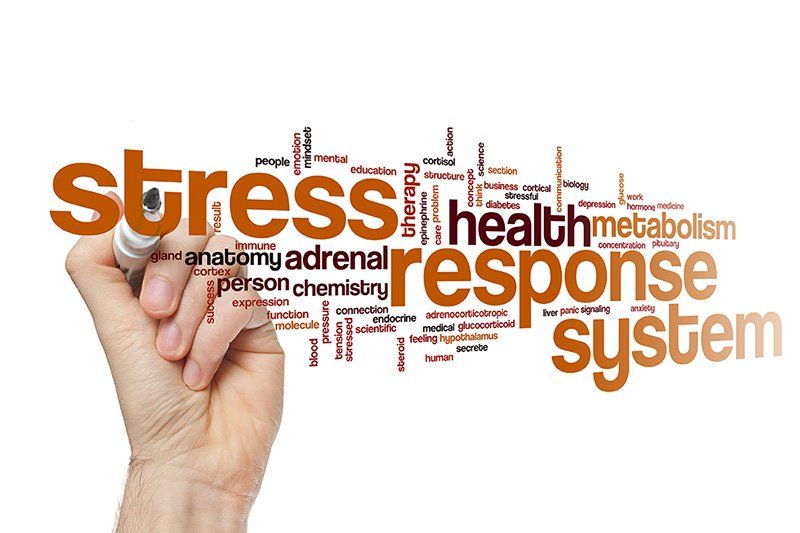The Adrenals: A Forgotten Organ
Dr. Terrence W. Harris • June 3, 2019
Just how important are the adrenals to your overall health and energy?
She was beyond exhausted.
She wakes up almost every day after what feels
like a good night’s sleep feeling ok, but by
mid-day, she’s running on fumes. She gets brain
fog, and feels like she needs a nap by 3 or 4 in the
afternoon. After experiencing a long day of work,
she then has to give the kids dinner and get them
to bed. She’s easily frustrated by their behavior –
and when yelling at them doesn’t work, she gives
up trying. When the kids are finally asleep, she
collapses on the couch, turns on the TV or pulls
out her phone to check in with Facebook, and
feels like she could fall asleep anytime.
Around 10:30, she finally decides to go to bed –
but then she sees the kids have left their toys all
over the living room. “Gotta clean that up!” she
thinks, “it’ll just take a minute.” An hour later, she’s
still tidying up – and her energy has returned!
She’s wired! No use wasting this second wind,
right? So she quickly logs on to her e-mail,
answers a few that she couldn’t get to during the
day, and logs off. It’s now midnight – she still has
energy, but realizes she has to wake up at 6:30am,
so she goes to bed. It takes a little while to fall
asleep, and after 6 hours of sleep, the cycle starts
again.
Sound familiar? I hear variations on this story a few
times a day from patients, friends, and even my wife.
This has become commonplace in our society. We
place a premium on productivity, financial gain, checking
off that “to-do list” – and if we aren’t reaching these
goals, we’re failing. We sacrifice health, rest and recovery,
and even in many cases happiness, in order to be
what we consider a “success”. It’s an impossible
standard to which we hold ourselves – and it’s unsustainable.
Why can’t we keep doing this and expect to be healthy
and happy? The answer lies, as it so often does, in our
hormones. More specifically – our Stress Response,
regulated for the most part by our Adrenal Glands.
The adrenals are small endocrine (think “hormone-producing”)
glands located on top of our kidneys. The
adrenal glands are responsible for producing and
distributing several vital hormones, including some sex
steroids (testosterone and DHEA), aldosterone (which
regulates salt and water and ultimately our blood pressure),
and the hormones we often associate with “fight
or flight” – epinephrine (or adrenaline) and cortisol. For
the purposes of this article, I’m going to concentrate on
cortisol – the most troublesome “Stress Hormone”.
What happens when we’re under stress? It all goes
back to our distant ancestors, early humans, and the
fight for survival. When confronted with a stressor – for
example, an animal attacking us – the body needs to
find a way to stay alive. To put it simply, we have to
either be able to run away, or fight. Adrenaline “pumps
us up”, increasing our heart rate and blood pressure,
helping to get oxygen to our muscles and brain, so we
can move – fast. Cortisol helps the body release stores
of sugar and increase fatty acids. Oxygen and sugar
are two things vital for muscles to work, fatty acids are
also important for the brain to function. Once the
threat is neutralized (we either kill the predator or run
away to safety), this stress response calms down and we
go back to our baseline metabolism. The adrenal
glands can recover, so they are ready to respond again
when the next threat arises.
This is a good system! And it’s served humans really
well, until recent history. The problem now is that our
stressors have changed. No longer can we simply run
away or eliminate the threat. One cannot simply stop
being a parent, for a ridiculous example. For another,
most of us can’t quit our jobs and expect the bills to be
paid. These stressors are constant – and constant stress
is NOT what our adrenal glands were designed to
handle.
So what happens? When the stress starts, our adrenals
do exactly what they’re supposed to do. Adrenaline and
cortisol are released, and we handle the stress. But
there’s no recovery. So the adrenals continue pumping
out these hormones. What started out as a beneficial
effect turns dangerous. Too
much continuous adrenaline,
and our blood pressure stays
elevated, leading to chronic
hypertension. Too much
cortisol, and our blood sugar
continues to rise, leading to
diabetes.
You may be asking, “if the
stress response is meant to make me capable of fighting
or running away, increasing energy to do so, why do I feel
tired?” Great question!
There are books written on this topic, so we can’t go into
all the details here. Here’s a quick oversimplification.
Adrenaline and Cortisol are not made “out of thin air”. It
takes protein (for adrenaline), certain vitamins (B vitamins
in particular), and cholesterol (for cortisol) – to name just
a few. During the stress response, remember the goal is
immediate survival. So the adrenals don’t care where
they get these things to make the stress hormones –
better to rob a less vital system in order to keep us alive.
These same building blocks are used in almost every
system of the body – protein and cholesterol are part of
every cell, B-vitamins are required for pretty much
everything to work. Cholesterol, which we all are taught to
think of as “bad”, is where all of our sex steroid hormones
come from (testosterone, estrogen, progesterone). So the
body diverts production of these hormones in order to
supply more cortisol – essentially knocking out our
production of sex hormones. This is one way chronic
stress leads to fatigue.
Chronic cortisol production also leads to a suppressed
thyroid. The relationship here is remarkably more complex
than that. But, suffice it to say
that chronic stress adversely
affects the thyroid.
Our bodies are very smart. After
a prolonged period of stress, the
brain recognizes that prolonged
production of Cortisol is
unsustainable, and even
dangerous. So, the brain
releases signals to shut down
production of Cortisol. And it
does this very well – too well.
The term “Adrenal Fatigue” is used to describe this
situation. But this term is a poor description of what is
occurring. There is really nothing wrong with the Adrenal
glands – they are still capable of making hormones. But
the brain’s suppression is just too strong. The body
doesn’t make the stress hormones, we’ve already depleted
our testosterone, our thyroid is already suffering, and we
feel all the symptoms we associate with being “stressed
out” – extreme fatigue, unable to handle any new stress,
irritability, brain fog, inability to concentrate, poor sleep
(cortisol is needed for a restful sleep), and depression.
All is not lost!
The good news is there are ways to combat this problem.
In an ideal world, we would eliminate the stress. But as I’ve
already pointed out, this just isn’t possible in most cases. So,
the first step is to take intentional steps to manage our
stress.
The most important aspect of managing stress is balancing
your schedule as much as possible – so that there are
regular “decompression” periods. Meditating for 10-15
minutes a day can have tremendous benefits. Take a short
walk when you are able (without the smart phone, if
possible). Find a hobby and spend a few minutes a day
doing it (for me, it’s the piano). Read a book for a few
minutes before bed. Anything you can do which requires
minimal thought, and allows you to “unplug” from the world,
will help.
Exercise is important too. But it doesn’t have to be extensive
or intense. Just get moving!
Get the right nutrition
We need to give our bodies what they need to function
optimally. Make sure there is enough protein, healthy fats,
and fiber in your diet. A good nutritionist, preferably one
with an understanding of the relationship between food and
stress, can help with this. It’s also important to pay attention
to what we shouldn’t be putting in our bodies – excessive
sugar, large amounts of caffeine, junk food tastes great and
we may even feel more energized afterwards. But these are
wreaking havoc on our adrenal glands.
Even though we are better off getting our vitamins and
minerals from food sources, sometimes it can be
challenging to get all the nutrition we need from food alone.
Supplements can be helpful, particularly if you are on
medications that can deplete nutrients, or are under
significant stress. In general, almost everyone can benefit
from a good daily B-Complex supplement, for example.
Simple blood tests can reveal other deficiencies as well.
Herbal support
The adrenal glands can be encouraged to “heal” by the
judicious use of herbal supplements. Such herbs, known as
“adaptogens”, help regulate adrenal healing, and will begin
to balance the production of stress hormones.
Replace missing hormones
When the adrenal glands go off kilter, so go the rest of our
hormones. As mentioned before, production of sex
hormones like testosterone, estrogen, and progesterone
are sacrificed in order to make more cortisol. A deficiency of
cortisol causes the body to find other ways to ramp up
metabolism, so the thyroid becomes taxed and starts to malfunction. (Thyroid dysfunction can also contribute to adrenal disorders – so a vicious cycle may be
created.) No hormonal system operates in a vacuum.
So, while working to fix the adrenal glands, you may
require supplemental thyroid medication, or extra
testosterone, in order to function optimally. This will
depend on the severity of your symptoms, as well as
tests for hormone levels. When adrenal dysfunction is particularly severe, it may even be necessary to replace
cortisol directly to support normal endocrine function.
This isn’t usually necessary, but it can be done using low
doses and for a limited period of time so that
dependence doesn’t become an issue.
The first step
In order to return ourselves to optimal health, it is
important to first recognize the symptoms that there
may be a problem. We are available to help you
determine if your exhaustion is due to Adrenal
Dysfunction. And if so, we can help you treat it. Get
started today by us for help.

Pregnancy Questions and Answers with Boca Raton Midwife Lindsay Leider You've got questions and Boca Raton Midwife Linsday Leider has the answers for you! Let's take a look at some of the most common questions we get from patients. Boca Raton midwife Lindsay Leider is a certified nurse midwife and advanced practice registered nurse. A University of Central Florida and University of Florida graduate, Lindsay has bee a practicing midwife at Women's Wellness Center in Boca Raton for several years now. The role of the midwife has expanded over the years. Modern midwives like Lindsay are true partners to their patients, helping to guide and being a direct part of the care team for the entire pregnancy. Midwives are also indispensable to patients during postpartum period.








